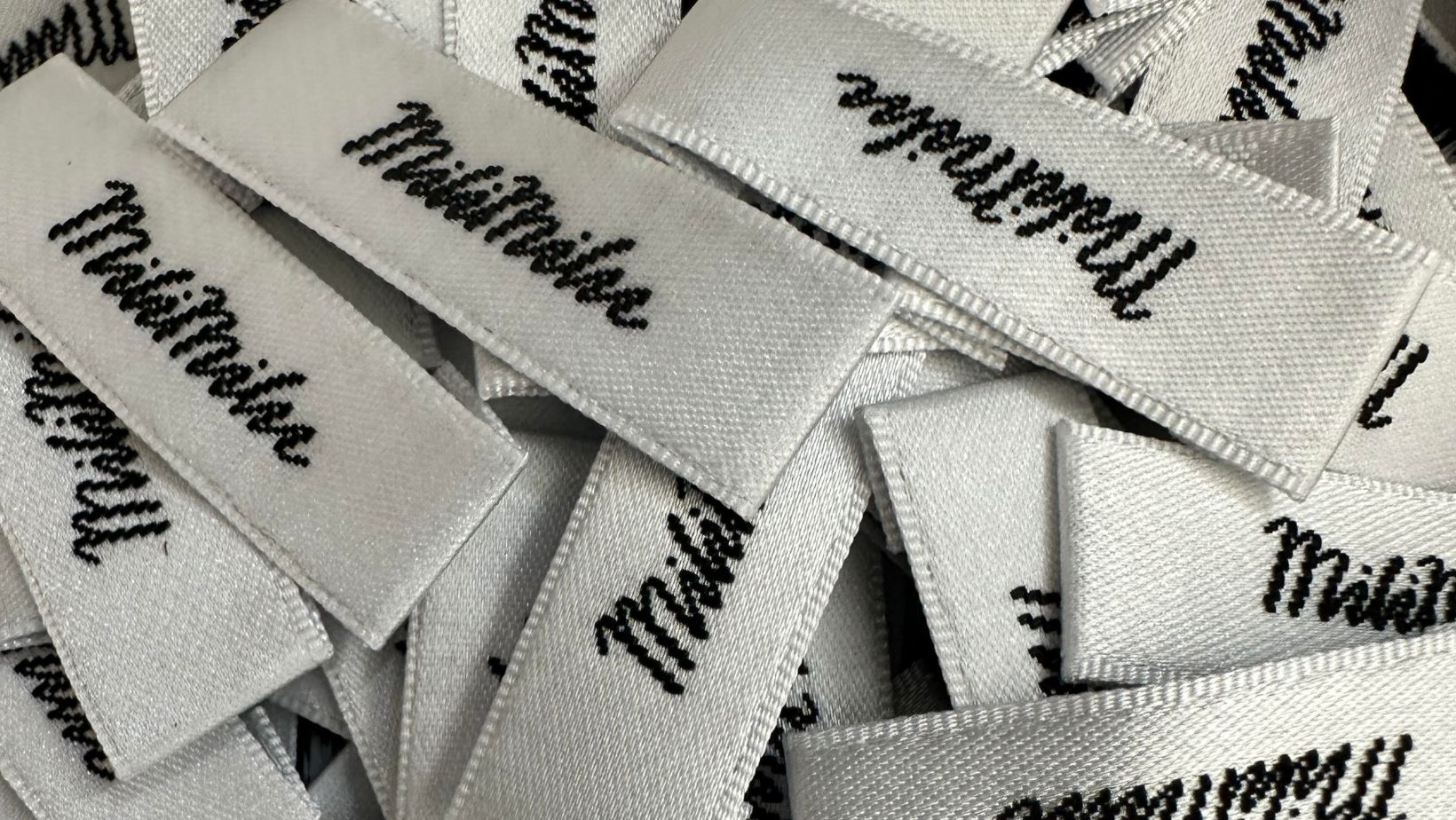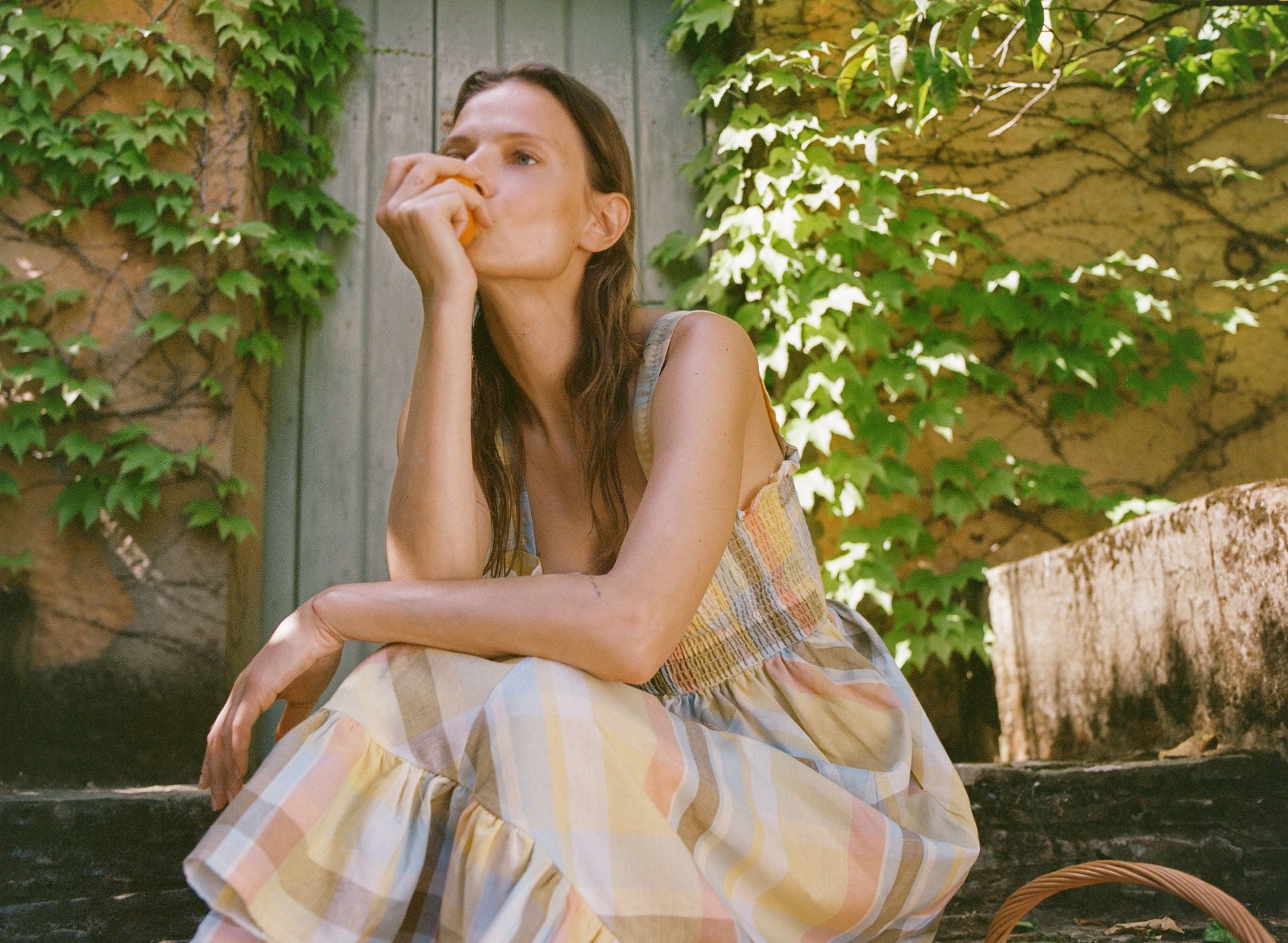Sustainable Textile Guide: Why We Love Organic Cotton

Take a look at your wardrobe and we bet you that quite a few items are made from cotton. We all are surrounded by this allrounder fabric, that is the go-to fiber to produce textiles, not only for clothes. Many other textile items in your home, such as bedding, towels and tablecloth e.g. are also made from cotton. Around a third of the fibers used to produce clothes and other textiles worldwide are cotton. But currently, only about 1% of all cotton produced worldwide is organic.
Conventional cotton is one of the most chemical-intensive fibers. Up to thousands of different chemicals can be involved in the process from seed to t-shirt; some of them with poisonous effects on the people handling them and a harmful impact on the environment. For that reason, cotton is also sometimes referred to as the dirty crop. While this applies to the conventional variations of cotton, organic cotton is much gentler to the environment and people, for obvious health aspects, but also social aspects.
For us at MiliMilu sustainable fashion and organic cotton go hand in hand for many reasons, from the production of the fabric to its multiple benefits when worn on a daily basis. Therefore, this episode of our sustainable textile guide will be all about why we love organic cotton.
Sustainable Textile Guide
Conventional cotton versus organic cotton - Impact on planet and farmers
As it goes with everything that is grown in the soil, organic is usually better for the environment, the people working with the crop and also the end-consumer. Cotton is no exception. Organic cotton is grown with methods and materials that have a lower impact on the environment and the production process is also much more gentle for the planet and everybody involved.
Growing Organic Cotton – Impact on the Soil & Water Usage
In the organic cotton production, the use of various ancestral farming techniques is dominant. The farmers build a biologically diverse agriculture, growing different crops and rotating them to maintain the fertility of the soil. This also helps to maintain moisture in the soil and store rain. It is also beneficial for the biodiversity of insects which are used to keep pests at bay, reducing the need of insecticides and pesticides. And of course, the farmers are not exposed to harmful substances in the process. These techniques encourage a diverse wildlife and protect the topsoil.
On the other hand, large amounts of insecticides and pesticides are required in the conventional cotton production. Statistics show that about onone-fifthf the world’s pesticides are used on cotton alone. They end up in the waterways, destroying the environment and being harmful to animals and humans. Entering the food chain and water supplies, they cause diseases, illnesses and even congenital disabilities among the farmers and people living close to the cotton fields.
Organic farming in contrast grows cotton without the use of pesticides and insecticides and the seeds are not genetically modified. The farmers aim for sustainability and the use of fewer resources. Consequently, the land stays fertile longer and the quality of the grown cotton is better than conventionally grown cotton. This also results in 46% less CO2 emissions.
Often cotton is referred to as the thirsty crop. As much as 2700L can go into the production of one cotton t-shirt. Compared to conventionally grown cotton, organic cotton needs about 90% less water. Farmers rely mostly on rain to water their fields. The soil, being healthy, acts like a sponge and retains water better for when rainfall is sparse.

Organic Cotton: The textile production process
While the growing of cotton has a huge impact on the environment, it doesn’t stop there. The production process of cotton yarns and textiles also must be considered. In an organic, environment-friendly production fibers will be treated using nontoxic products that are safe for the environment and people. To dye the fabrics, a sustainable organic process will only allow for low-impact natural dyes that have a low metal and sulfur content. For printing only low-impact, water-based inks will be used. This reduces the use of thousands of different, harmful chemicals that are used in the conventional production. Workers are thus not put into harm and can work under safe and healthy conditions.
Social aspects of growing and producing organic cotton textile
Using crop rotation and more sustainable farming techniques equals a more reliable income for farmers. They are not dependent on one crop only and are thus more resistant against price fluctuations on the cotton market. This promotes food security, higher financial returns to farmers and on top empowers women who make up about 10% of organic farmers worldwide.
Continuing down the line from crop to a t-shirt, using environment-friendly, sustainable production techniques in textile production also benefits the workers. They get to work in a safe, healthy, non-abusive, non-discriminatory environment that provides them with living wages.

Why we love Organic Cotton: Benefits of organic cotton clothing
We hope you are already convinced on how organic cotton is just better for the environment and the people involved. But there is more. Organic cotton also has many benefits and advantages for the end-consumer, especially babies and people with sensitive skin and allergies.
Organic cotton benefits babies and people with sensitive skin
People with sensitive skin and allergies benefit from wearing organic cotton clothing, including babies and children whose skin is much more sensitive at a young age. Babies and young children absorb more of their environment through their skin as it is not yet as thick as adult skin. The epidermis part of their skin is actually three to five times thinner. As a result, it is less resistant, and substances can be absorbed more easily and penetrate deeper skin layers. For that reason, organic cotton, and other organic textiles for that matter, is beneficial as it limits the exposure of babies and children to potentially harmful chemicals through their clothes.

Organic cotton is much softer
Organic cotton is much softer, looks good and feels amazing on your skin. It is hypoallergenic and safe for all skin types. And especially for people with chemical sensitivities and allergies, organic cotton can relieve their symptoms and provide them with more quality of life.
Organic cotton is breathable and absorbs moisture
Cotton is breathable and absorbs moisture well. Actually, cotton can absorb up to 2.7 times its own weight in water. It will keep you dry by absorbing sweat and moisture and expels body heat at the same time. It helps circulate the air and thus helps regulate your body temperature. Cotton also doesn’t hold on to sweat and stays odor-free.
Organic cotton is easy to take care for
Maintaining cotton is easy. Your organic cotton clothing can be easily washed and generally doesn’t need ironing. Also, worth mentioning that it is more stain resistant. It also becomes even softer over time and can be washed over and over again without impacting its texture.
Organic cotton lasts longer
The way organic cotton is harvested and treated during the production process leaves the fibers of the cotton intact. They are longer and more resistant. The result is a susuperior-qualityf fabric. Clothing made of these fabrics will last longer, wash after wash. This means that you can enjoy your organic cotton clothing for a longer period of time and will probably be able to pass it on. As a result, there is less need for new clothing over time which makes it the more sustainable choice for our planet.
Organic cotton textile is not equal to organic cotton textile, as the amounts within a fabric can vary, the growing process might differ as can the production process. It is thus advisable to keep an eye out for certifications to be 100% sure of what you buy.

Some of the most prevalent certifications for organic cotton
Various certifications for organic cotton are out there. They vary mainly as to which areas of cotton production they consider for their certification and to what extent. They might consider the amount of organic cotton used in a fabric, which sustainability standards have been followed throughout the production process and also might include fair labor standards.
GOTS – Global Organic Textile Standard for Organic Cotton
Among the independent certification organizations, GOTS, the Global Organic Textile Standard, is the gold standard for certified organic cotton. Most of our organic cotton clothing at MiliMilu is certified with this most thorough standard.
To obtain the GOTS label for organic cotton, garments must contain at least 95% certified organic fibers. Garments with a minimum of 70% certified organic fibers can carry the label “made with organic materials”. The certification includes ecological and social criteria and takes the entire textile supply chain into consideration. Everything from the chemicals used along the process to the fair treatment of the workers is included and it is mandatory to meet all the criteria listed to become GOTS certified.

OEKO-TEX for Organic Cotton
Another renowned certification is OEKO-TEX, which mainly guarantees that the textiles have been produced without harmful chemicals and under sustainable conditions. The fibers are not necessarily from an organic origin though. A certification for organic cotton, considering the organic origin of the cotton will be introduced by April 2023.
OCS Standard – Organic Content Standard for Organic Cotton
The OCS Standard – Organic Content Standard certifies that a product contains 95%-100% organic material. The certification also considers the route of the raw material from the source to the final product.
BCI – Better Cotton Initiative
BCI – Better Cotton Initiative is the largest cotton sustainability non-profit program worldwide. It supports cotton farmers to work towards more sustainability while reducing their impact on the environment. The organization focuses on educating farmers on environmental protection through reducing water and use of chemicals; sustainable management of crop and soil and better the working conditions. Under the BCI program, farmers can still use GMO cotton seeds and chemicals, but are supported in making the transition towards a more sustainable way of producing cotton. BCI adhering farmers now account for about 19% of the global cotton production.

Organic Cotton for the whole family
There are many reasons why we at MiliMilu love organic cotton and the benefits for everyone in the family from babies to adults and especially those with sensitive skin and allergies are considerable. We also know that the price for organic cotton clothing might be a bit more expensive than conventional cotton items, but in the long run, impact on the earth and ourselves considered, organic cotton clothing remains the choice we will always make.
Also, we at MiliMilu wouldn’t be MiliMilu if we hadn’t found the most adorable choices of organic cotton clothing for the whole family that not only convince through their style. The matching possibilities are endless, including cute mommy & me styles, from dresses, to t-shirts and cute baby outfits and matching family outfits, we got you covered. Did you know that we also have a range for men and boys? So don’t wait and head over to our shop and explore our organic cotton clothing range.

To look further into our sustainable textile guides: We also are in love with linen for similar reasons. Nothing like a breathable, airy, comfortable and stylish linen dress to make you feel like a queen on a hot and humid Hong Kong day!
Stay tuned for the newest releases of new sustainable fashion and other MiliMilu news by subscribing to our newsletter, like our Facebook page and follow us on Instagram.




Comments